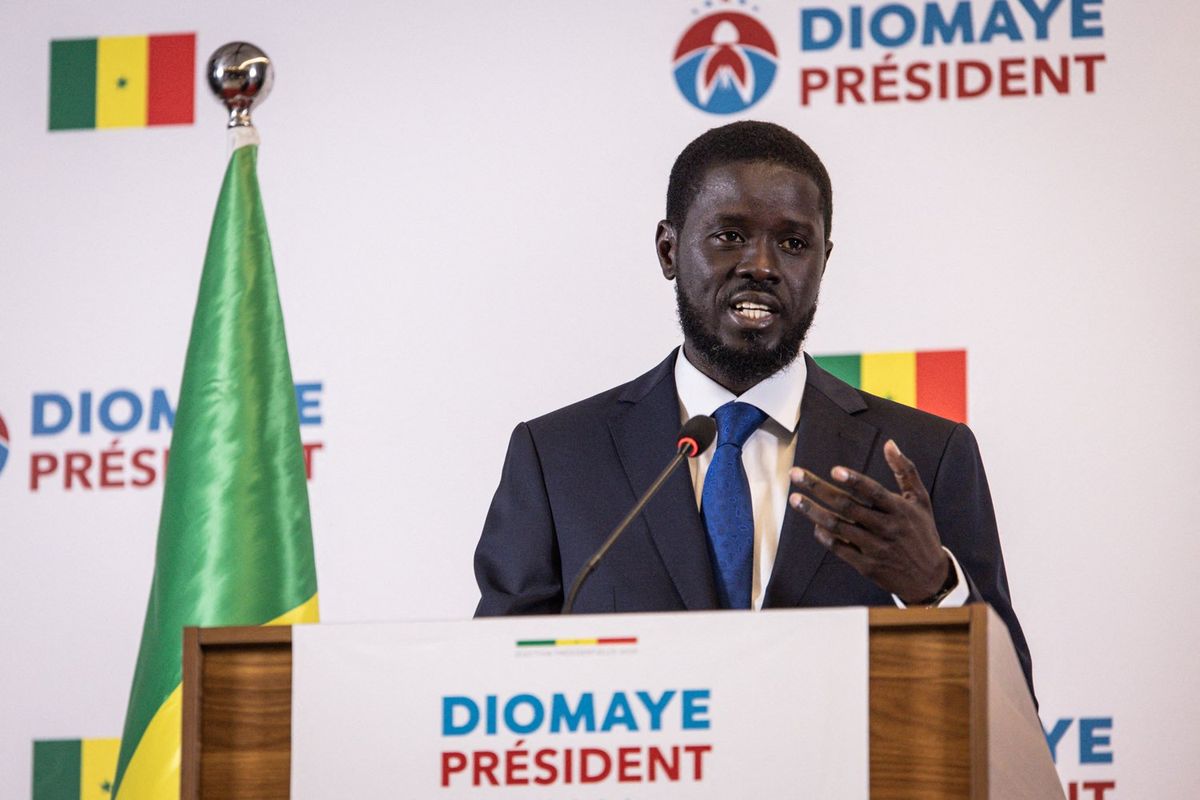After being confirmed, Bassirou Diomaye Faye, the former tax inspector will be the youngest president in the West African country's history.
Ten days before the updated date for Senegal’s presidential election, Bassirou Diomaye Faye was still in detention. Nearly a year ago, he was arrested in Dakar, with police citing charges of spreading false news and defamation of a constituted body. Days before, Faye had made a post on Facebook alleging that the administration of outgoing President Macky Sall was trampling on the judicial rights of its citizens, citing the then-ongoing saga of opposition figure Ousmane Sonko.
Prior to that arrest, Diomaye Faye was barely known by the Senegalese public. Even now, as he’s set to become the youngest elected president in Senegal’s long-running, uninterrupted democratic history, the depth of public information on him is relatively shallow. Perhaps, that’s the effect of being detained for almost all of the period he could’ve better acquainted himself with the public.
But the heavyweight cosign of Sonko, hugely popular amongst the youth, and basing his limited campaign appearances and interviews on passionately advocating for a changing of the old guard, not only endeared him to many voters but also identified him as one with the people.
“If the Senegalese people want a paradigm shift, transparency in the management of public funds, equitable sharing of resources, let them try me as President of the Republic. I come from a difficult background. I have a journey too,” he told Walf TV in an exclusive interview days before the election.
The 44-year-old Bassirou Diomaye Faye was born and raised in Ndiaganiao, a small village located within the M’Bour metropolitan area, in the Thies region of Senegal. There are no details about the social circumstances of his upbringing, but growing up in a rural environment certainly means there were limited luxuries, if any. After attaining a master’s degree in law, he enrolled in the National School of Administration (ENA), then became a tax inspector after his graduation.
At the Tax and Estates department, he became friends with Sonko, a colleague and fellow ENA alumni. When Sonko founded the political party, PASTEF, in 2014, Diomaye was only a guest, but he joined the party and became a prominent member, playing a key role in Sonko’s 2019 presidential bid, where he came third with 16 percent of the votes.
With Sonko battling legal issues, Faye stepped up as PASTEF’s General Secretary during the 2022 parliamentary elections, helping an opposition alliance win 56 seats. Endorsed by a coalition of political parties, including the now-banned PASTEF, Faye was now firmly in the spotlight. Supported by his charismatic friend, he ran with the slogan, “Diomaye is Sonko,” buying into the existing fervor of Sonko supporters.
While there are concerns that he might end up operating as a proxy president till Sonko is eligible to contest in the next elections, Faye has pushed back by stating that he will be receiving help from many others. “We don’t just need one person to turn this country around,” he said in the Walf interview. “Why are people only interested in Ousmane Sonko and not the others who will support me in managing the country?”
A “left-wing pan-Africanist,” Faye has proposed several radical moves, including a currency change from the CFA Franc, the legal tender used by eight West African countries and pegged to the Euro. Upon release from detention, though, he tempered the proposal following concerns about the effect a currency change could mean for investors and the country’s budget. “There’s no sovereignty if there’s no monetary sovereignty,” he said in a press conference, after Sonko said the coalition will try to implement reforms at a sub-regional level first.
Diomaye has also stated that there will be important constitutional changes. In his party’s manifesto, it’s been proposed that the Constitutional Council be moved to a Constitutional Court with its autonomous powers, definitively separating the judiciary from the executive arm of government. He has also decried the heavily centralized system of power that gives the president a great, unchecked level of authority, proposing the creation of the office of Vice President, with its own clear, defined duties and powers.
In addition to these institutional reforms, Faye and his coalition will be renegotiating mining and energy contracts to better serve the general public, especially as Senegal is set to become an oil-producing country this year. It’s hoped that this move, amongst others, will give the economy a much-needed boost, and drastically reduce the unemployment rate and the poverty numbers – over one-third of Senegalese live under the poverty line, according to World Bank data.
It’s a little unclear when Faye will take office. The delayed election leaves almost no time between the verification of official election results and the April 2 exit of Sall, who has already called to congratulate his successor-in-waiting. When he does take office, it is hoped that his calm demeanor and seemingly clean profile will translate into a great period of leadership.
“I will govern with humility and transparency,” he said in a press conference earlier today, vowing to fight corruption and prioritize national reconciliation.

